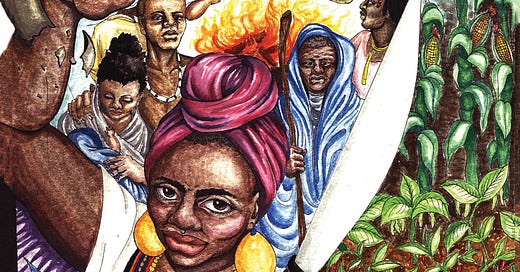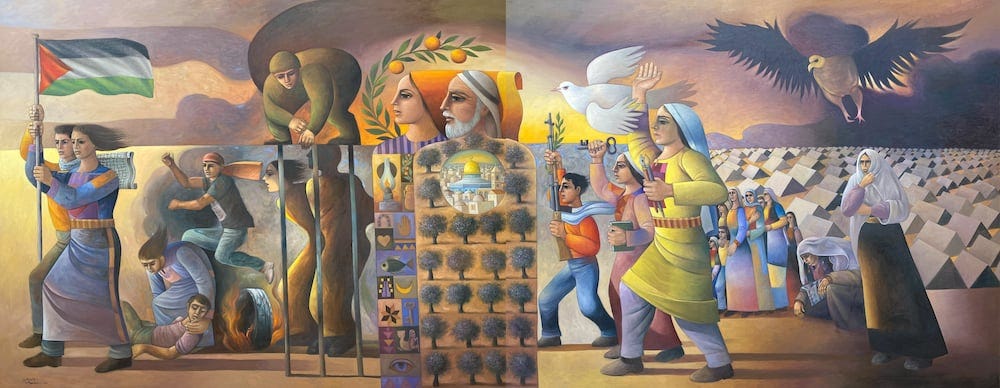Oppressions that never go away
a quiz that might surprise + reading and listening recs that might educate
All work under capitalism has an element of coercion: if we’re not born to a rich family, our choices are to work for the wealthy, to live as a criminal, or to starve. It’s not a great choice, given the kinds of violence directed against those who steal abundance through lawbreaking or those who organizing collectively to try to improve the conditions of work.
When we talk about slavery in the modern context, though, we usually mean chattel slavery: a system in which people can be forced to work, they can be bought and sold, any compensation they might receive can be claimed by their so-called owners and used entirely for substandard food and housing, their so-called owners can kill them without consequences, and they are assigned to slavery because they belong to an oppressed group, meaning their children are likely to be born into slavery.
Prison slavery, like the kind practiced in the US, UK, Russia, and China, is brutal, but I think it’s fair to say that chattel slavery is the most brutal form practiced in human history. In all my research, I’ve only found two historical instances of chattel slavery: that practiced by the Roman Empire and some contemporary empires; and the far more widespread, deadly use of enslavement that was a fundamental element in the development of capitalism and the global dominance of European institutions. Without chattel slavery, capitalism would not exist, and settler states like the US would not exist.
And though chattel slavery is now illegal globally, there are more people who are enslaved in some way—working as involuntary laborers—than ever before in history. Capitalism cannot exist if we are not forced to work.
(It could be legitimately argued that some Muslim empires and the Chinese state before 1900 also engaged in chattel slavery, although there were some features of both those regimes that were less brutal than the form of slavery spread by the Romans and by capitalists.)
Many human societies have contained strong or weak hierarchies, sometimes with punitive measures of enforcement. In other cases, there were no enforcement mechanisms, only soft techniques of acculturation and tradition. However, most human societies never practiced any form of slavery, and many have been deliberately egalitarian and non-hierarchical.
So, which was the last country to outlaw slavery? You can find the answers to the quiz below, but don’t forget to check out the recommended readings!
And first, our friends at the Cowley Club still need some support! Drop this long-time social center in Brighton a few bucks if you can! https://ko-fi.com/cowleyclub
Which was the last country to outlaw racialized chattel slavery
The final one is not a quiz, but a poll:
In your experience (having lived there or spoken to people from there)…
Reading and Listening!
For more reading on real abolition (much better than my rant on Friday), SSB sent me a link with a great resource list, from Joy James to Neal Shirley. Thanks SSB, whoever you are!
Speaking of Joy James, check out this talk with her, Marsha Hinds Myrie, and Khadija Haynes:
A powerful essay from Andrea Gibson on chemotherapy and voice loss:
This one is devastating, brave, and really important to read: “For Black Archaeologists, the Atlantic Ocean Is an Ancestral Graveyard”
In the category of proposals for the climate change that make things much worse, give this one a read:
“Colonial Ecologies of the Half Earth” by Austin Miles. This article on the “half earth” approach—which is basically ramped up neocolonial conservationist land theft on steroids—underscores some important points that we should never forget:
* Rich people suck. In a jam, they will always try to find a solution that impoverishes somebody who is already screwed over, that causes extensive harm, that shows a profound ignorance of the problem, and that makes it even worse.
* State planners, capitalists, and scientists may be very intelligent in specific fields, but they are systematically reductionist, meaning they tend to be incapable of appreciating or understanding complex systems, and to impose their plans and blueprints on the world they generally have to engage in egregious simplifications, which only ever fit on the actual territory through the implementation of brutal violence. In the end, coercion, enslavement, and warfare are the sciences they have perfected the most.
*Capitalism and the State “subordinate Indigenous knowledge,” which leaves us all in a really bad place if what we care about is survival. Instead of the progressive alternative, exploiting Indigenous knowledge, how about we give meaningful solidarity to Indigenous struggles to preserve and spread their knowledge, and to win their land back.
*The article also underscores how destructive mining is, with recent examples from Ohio and Canada, or the example of how Roman mines established over 2000 years ago are still causing groundwater pollution (in fact I visit one such mine, in Murcia, and describe it in The Solutions Are Already Here: Strategies for Ecological Revolution from Below).
https://undisciplinedenvironments.org/2022/04/05/colonial-ecologies-of-the-half-earth/
Answers to the Quiz!
Question 1:
Brazil abolished slavery in 1888.
Going back to its first constitution in 1956, slavery was never legal in Pakistan.
Haiti may have actually been the first modern country to abolish slavery, given its origins in a revolutionary uprising by enslaved Africans in 1804. However, since the authoritarian current won out in the Haitian revolution, under the leadership of Toussaint Louverture, the new government did make certain accommodations with the French state to compensate plantation owners. For more, read “The Dragon and the Hydra” by Russell “Maroon” Shoatz.
The correct answer is actually Australia, which permitted the enslavement of Aboriginal people until reforms in the 1970s.
Question 2:
The correct answer is “all of the above.”
Arguments could also be made that countries like Japan and Switzerland qualify as segregated, because of the degree to which racism is legally and structurally integrated.
Question 3:
Here are a few articles relevant to the poll
Ongoing political attempts to weaken the Maori: https://www.theguardian.com/world/article/2024/jul/29/maori-leaders-new-zealand-coalition-government-policy-changes
Canada masked its nature as a settler state by insisting on fair and legal treaties with First Nations peoples (negotiating down the barrel of a gun), but it turns out if there was never any treaty, it actually didn’t make a bit of difference. https://www.theguardian.com/world/article/2024/aug/02/anishinaabe-canada-treaty
And as for Israel, oh boy:
Israel is Committing Genocide
The rallying cry of “Never Again” was raised in multiple languages in 1945 by the liberated prisoners of the Buchenwald death camp, where tens of thousands of anticapitalists, Jews, Romani, Soviet POWs, Poles, queers, and disabled people were executed by the Nazis as a part of the Holocaust, in which they murdered around 12 million people all across Eur…








Follow-up question: You write: "Switzerland qualifies as segregated, because of the degree to which racism is legally and structurally integrated." I live in this country, and i agree with the structural part, there are a lot of police killings of black men, specifically in one part of Switzerland. But afaik (as of now) this is not legally based. Could you maybe point me to some articles where i could read up on this further?
Hey just an FYI that the word 'aborigonies' is largely considered a slur today. Aboriginal people or Indigenous is the better term to use.